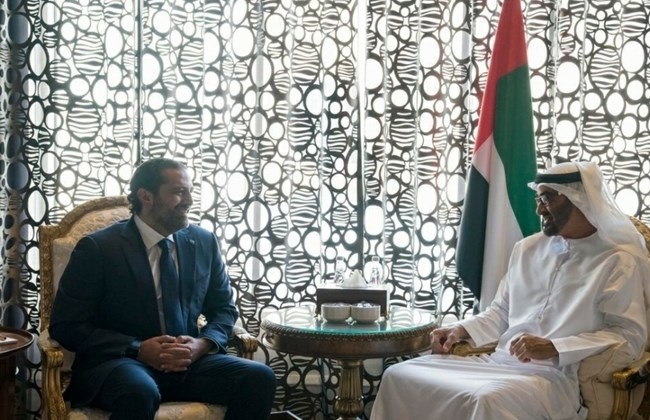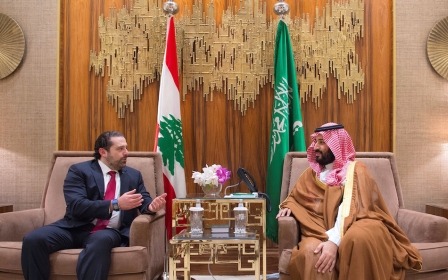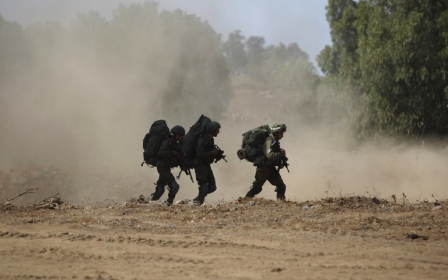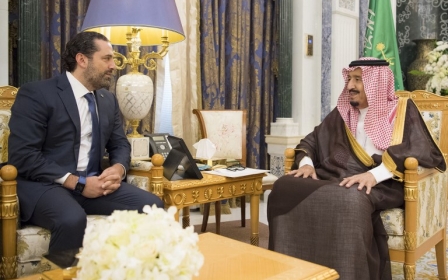Lebanese PM Hariri returns to Riyadh after flying visit to Abu Dhabi

Lebanese Prime Minister Saad al-Hariri, who on Saturday announced his resignation during a visit to Saudi Arabia, on Tuesday travelled to Abu Dhabi for a meeting with Emirati Crown Prince Mohammed Bin Zayed, before returning to Riyadh, according to Hariri's office and Saudi-owned media.
The timing of Hariri's sudden and unexpected resignation, which came amid a wave of arrests targeting high-profile Saudi political and business figures seen by some as a move by Saudi Crown Prince Mohammed bin Salman to consolidate his power, has raised concerns about Riyadh's influence in Lebanon amid escalating regional rivalry between Saudi Arabia and Iran.
The uncertainty surrounding Hariri's announcement has left many in Lebanon who spoke with MEE this week concerned that the country will be caught up in fresh regional tensions.
“We have lived through the civil war and had to move to Africa - Sierra Leone," said Fadi Leba’ine, a 59-year-old food preserves salesman in Beirut.
"Now my son, who is 35, has to live through the same struggle I had to face when I was young. I imagine the children of my nephews will also have to live through the same things all over again."
A photo published by the UAE's state-run Emirates News Agency (WAM) on Tuesday showed Hariri meeting Bin Zayed, a key ally of Mohammad bin Salman, in what appeared to be the same suit and tie that he wore in photographs of his meeting with Saudi King Salman bin Abdulaziz Al Saud on Monday and to deliver his resignation speech on Saturday which was broadcast live by Saudi Arabia's al-Arabiya television channel.
Hariri thanked the Emirati leadership for their support for Lebanon and the two men discussed the challenges that Lebanon faced and the "regional interventions" that were obstacles to the prosperity and peace of the country, WAM reported.
Hariri said on Saturday that he believed there was a plot to kill him and accused Iran and Lebanon's Iran-backed Hezbollah movement, which is part of the Hariri-led coalition government in power in Lebanon since last year, of sowing unrest in the Arab world.
Lebanese President Michel Aoun has said that he will not accept Hariri's resignation until he returns to Beirut and explains the circumstances in which he had made his decision to quit.
The newspaper also said that Egyptian President Abdel Fattah el-Sisi had told Lebanese Parliamentary Speaker Nabih Berri that he feared Hariri may be under house arrest.
Sisi also told Berri that Egypt's general intelligence had not found any evidence of an assassination plot against Hariri, the paper said.
Saudi Foreign Minister Adel Jubeir said on Monday that Hariri had not been forced to resign and was free to leave the country any time.
Hariri's resignation has brought fresh scrutiny on his ties to Saudi Arabia, where he holds citizenship and owns substantial business interests.
The Hariri family's major interests in Saudi Arabia date back to 1978 when the Saudi Oger construction company was founded by Saad's father Rafik, the former Lebanese prime minister who was assassinated in 2005.
Saudi Oger was responsible for building vast swathes of Saudi Arabia and helping develop the cities of the desert kingdom into some of the world's leading metropolises.
It also made the Hariri family multi-billionaires - Saad Hariri was estimated to worth around $4.1bn in 2005 shortly after his father's death. The Hariris were also granted Saudi citizenship as a result of their contributions.
In recent years, however, a tanking Saudi economy combined with allegations of corruption have damaged the fortunes of the company and Hariri, who as of December 2016 was worth just $1.3bn, according to Forbes.
Middle East Eye propose une couverture et une analyse indépendantes et incomparables du Moyen-Orient, de l’Afrique du Nord et d’autres régions du monde. Pour en savoir plus sur la reprise de ce contenu et les frais qui s’appliquent, veuillez remplir ce formulaire [en anglais]. Pour en savoir plus sur MEE, cliquez ici [en anglais].




